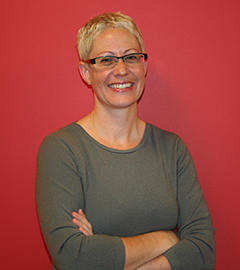Fourteen law students recently got a firsthand glimpse of the correctional system during a semester-long class that was conducted inside the walls of the Federal Detention Center in Philadelphia.
Professor Rose Corrigan arranged to teach Crime and Justice in the U.S. through the Inside-Out Prison Exchange program, which allows graduate and undergraduate students to take classes with those living in correctional facilities. While hundreds of Inside-Out courses have been offered internationally over the past 20 years, the Kline School of Law is among the first to offer a JD-level course, Corrigan said.
Both groups of students benefited from the class, Corrigan said, adding that each learned from the other.
“For many of them, it was a profoundly moving experience,” said Corrigan, who holds joint appointments at the law school and Drexel’s College of Arts and Sciences.
 Corrigan used “Race to Incarcerate,” a graphic textbook that explores sentencing policy and the exponential growth of the prison system, as the core text, while requiring students to read, write about and discuss articles from scholarly journals and the writings of Brazilian philosopher and educator Paulo Freire.
Corrigan used “Race to Incarcerate,” a graphic textbook that explores sentencing policy and the exponential growth of the prison system, as the core text, while requiring students to read, write about and discuss articles from scholarly journals and the writings of Brazilian philosopher and educator Paulo Freire.
For the “inside” students, few of whom have studied beyond high school and some of whom have limited English skills, the discussions and writing assignments provided a measure of confidence as well as insight, Corrigan said.
“Words and language have power. They learned how to tell their stories in ways that are powerful,” Corrigan said. “We should all be able to critically evaluate experiences, so we can be theorists of our own lives.”
Among the revelations for the law students was learning that some viewpoints held by inside students defied their expectations.
“There were inside students who were anti-crime, pro law enforcement and wanted to be strict toward people who commit crimes,” said Fatima Agosto, a rising 3L. “That was surprising to me, and the opposite from what I think about the ways that neighborhoods should be policed.”
Indeed, rising 3L Katie Wood said, those who voiced the most lenient opinions, such as favoring the legalization of drugs, were some of her fellow law students.
“I said, ‘You’ve got to be kidding. Have you heard of fentanyl,’” recalled Wood, who is completing a co-op placement with a district attorney’s office and hopes to become a prosecutor.
“Spending so much time with these women reminded me that everyone has a story and that everyone should have a right to tell their side of the story, if they wish to,” Wood said.
Wood learned that many of the women seemed not to understand why they had received the sentences they were serving, a phenomenon she found as troubling as mass incarceration.
Agosto felt that some of the inside students seemed to accept undue responsibility for stepping onto a path that led them into the criminal justice system.
“Yes, they had a choice, but what options were they given,” Agosto asked. “That was not a very clear concept among some inside students.”
Dave Castaldi, a rising 2L, said the experience will serve him well as he pursues a career representing criminal defendants.
“They’re people with potential,” Castaldi said. “If you want to be a good advocate, you have to understand people’s stories.”
Along the way, some of the law students developed personal attachments to their classmates and a sense that the circumstances that had separated them were random.
“I could have made that same mistake,” Agosto said. “I had the freedom to leave at the end of the night. It was very difficult for me. It was very sad.”